In recent days, tensions between India and Pakistan have reached a critical point following the horrific Pahalgam terrorist attack that claimed 26 lives. As India responds with the suspension of the Indus Waters Treaty (IWT), reports indicate that Pakistan is seriously considering withdrawing from the historic Shimla Agreement of 1972. This blog explores what if Pakistan cancels Shimla Agreement and the far-reaching consequences such a move would have for both nations and the broader South Asian region.
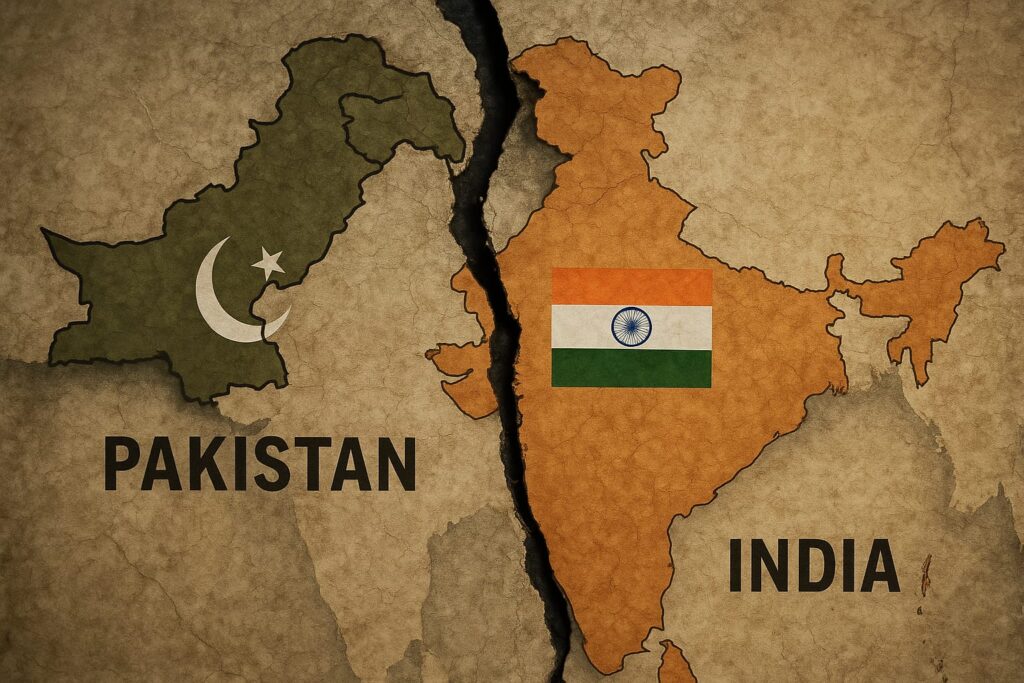
Table of Contents
The recent escalation between India and Pakistan has sparked a flurry of reactions on social media, with Pakistani commentators and officials strongly criticizing India’s suspension of the Indus Waters Treaty and hinting at further diplomatic fallout. Wajahat Kazmi tweeted, “India knows it cannot fight a war with Pakistan because the last time they tried crossing border, their pilot was given a brutal thrashing and became a global mockery for India. Now they have foolishly suspended the Indus Water Treaty, shamelessly trying to stop Pakistan’s water”. Ch Fawad Hussain argued that India’s move is a “gross violation of treaty law” and warned that it would “effect only poor farmers of Punjab and Sindh,” framing the decision as both illegal and harmful to ordinary Pakistanis. Brigadier Ashfaq Hassan went further, stating, “Pakistan also has the right to walk away from Shimla Agreement and all such other agreements at its own as a response” and questioning the credibility of Indian guarantees in international agreements. He also listed concerns about the broader implications, asking, “Can India even physically implement this one sided suspension?” and warning that “all measures are reciprocal and will be well taken care of”. These tweets collectively reflect a sense of outrage in Pakistan, a readiness to retaliate diplomatically, and a narrative that India’s actions are reckless, unlawful, and ultimately self-defeating.
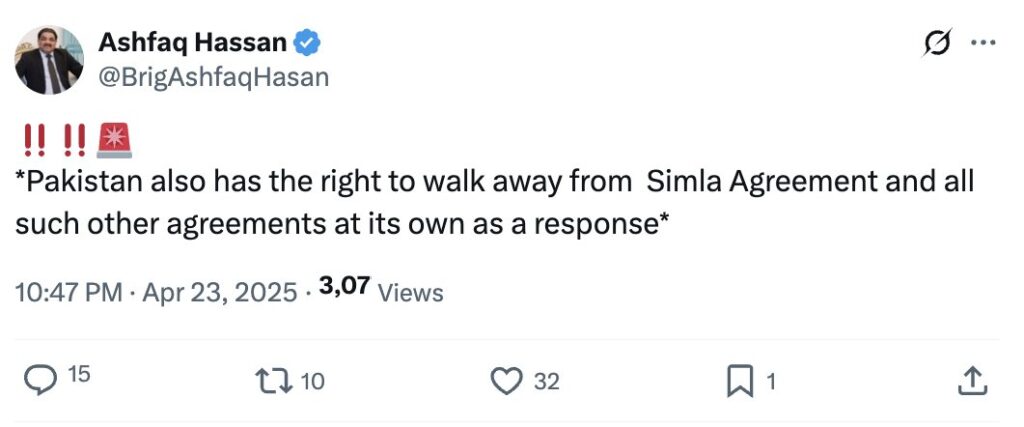
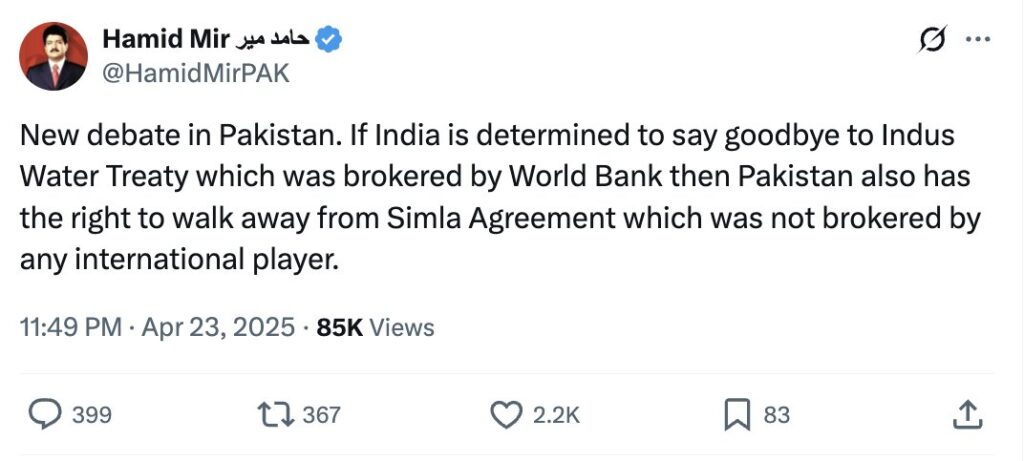
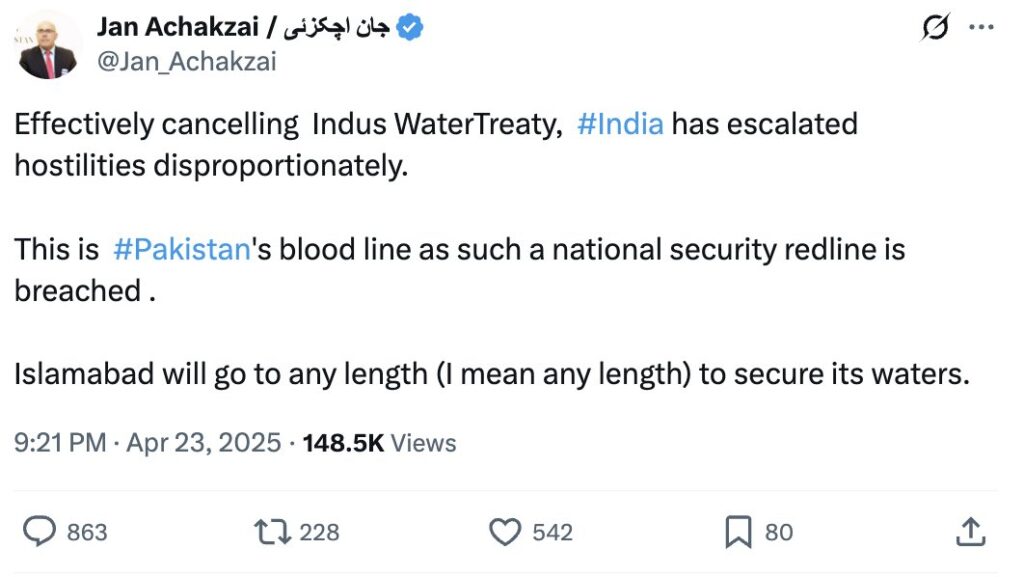

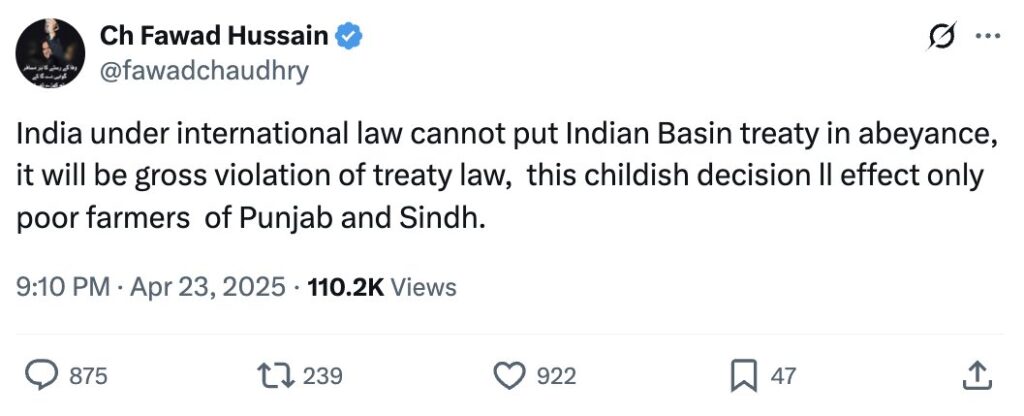
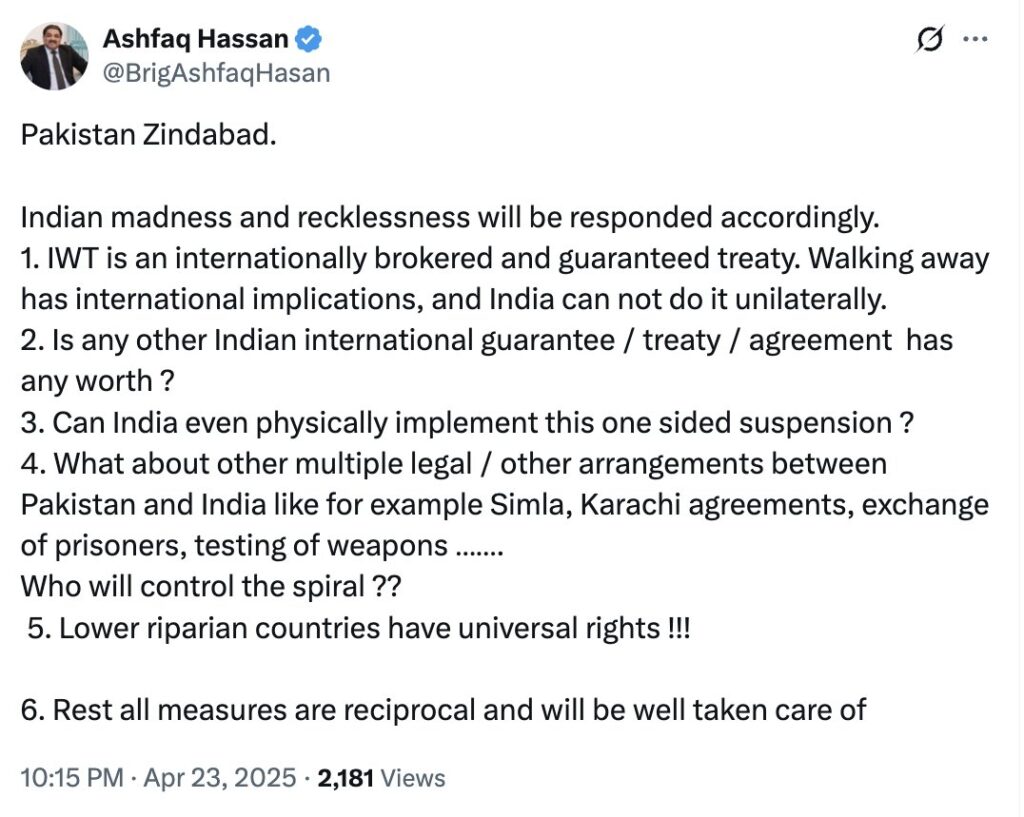
Despite the rhetoric from Pakistan, India currently holds a clear upper edge in this confrontation. By suspending the Indus Waters Treaty, India is leveraging its upstream control over vital water resources, directly impacting Pakistan’s agriculture-dependent economy, which relies on the Indus system for 80% of its irrigation. India’s robust global alliances and its narrative of acting against cross-border terrorism have garnered international understanding, if not outright support, while Pakistan remains under scrutiny for its alleged links to militant groups. Furthermore, India’s economic and military capabilities far surpass those of Pakistan, and its internal stability contrasts with Pakistan’s ongoing political and economic crises. This combination of strategic, economic, and diplomatic strengths allows India to dictate the terms of engagement and maintain the initiative, reinforcing its position of advantage in the ongoing standoff.
What is Shimla Agreement?
The Shimla Agreement is a peace treaty signed between India and Pakistan on July 2, 1972, after the 1971 war that led to the creation of Bangladesh. It was signed by Indian Prime Minister Indira Gandhi and Pakistani President Zulfikar Ali Bhutto in Shimla, Himachal Pradesh. The agreement aimed to restore friendly relations and peace between the two countries by making both sides promise to settle their disputes through direct talks (bilateral negotiations) and not involve other countries or organizations. It also established the Line of Control (LoC) in Jammu and Kashmir, with both countries agreeing not to change it by force, and to respect each other’s territorial integrity and sovereignty. The Shimla Agreement remains an important foundation for managing relations and resolving issues between India and Pakistan peacefully.
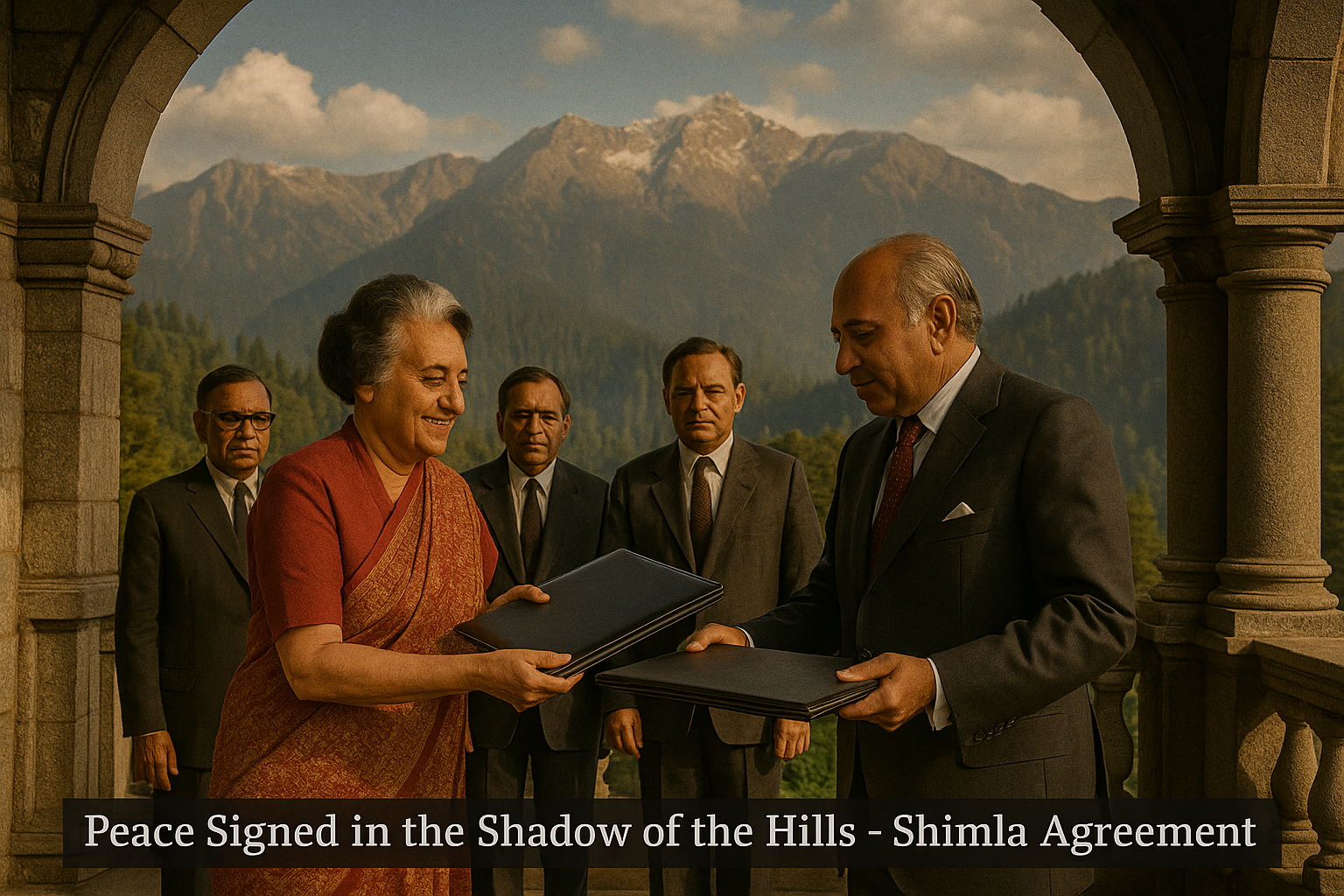
What If Pakistan Cancels Shimla Agreement: Understanding the Context
The current crisis stems from India’s decision to suspend the Indus Waters Treaty following the Pahalgam terrorist attack. According to recent reports from April 24, 2025, Pakistan is contemplating withdrawal from the Shimla Agreement in direct response to India’s unilateral modification of its commitments under the IWT. India has cited Pakistan’s repeated obstruction in project clearances and growing geopolitical hostility as reasons for its actions regarding the water treaty.
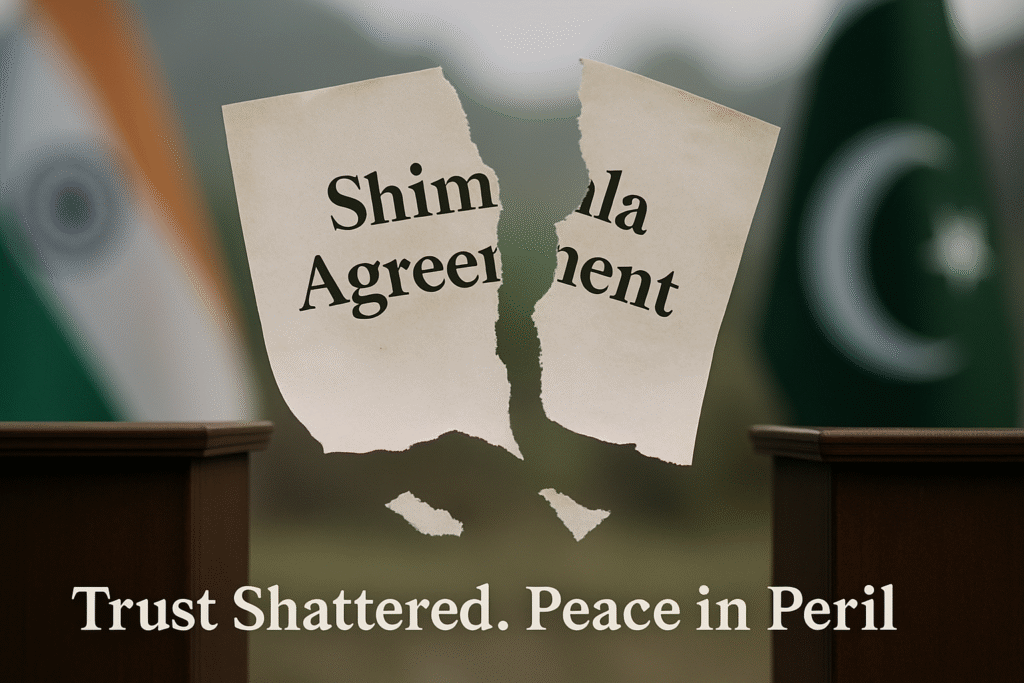
The Shimla Agreement, signed on July 2, 1972, between Indian Prime Minister Indira Gandhi and Pakistani President Zulfiqar Ali Bhutto, established the framework for peaceful resolution of disputes through bilateral dialogue following the 1971 Indo-Pakistani War. One of its core principles was the commitment by both nations to resolve issues through peaceful means without altering the Line of Control unilaterally.
Critics within Pakistan have long argued that bilateral talks over the years “have resulted in wasting about five decades without any outcome” due to what they perceive as India’s rigid and uncompromising attitude. They point to India’s 2019 abrogation of Articles 35A and 370 of its Constitution, which gave special status to Jammu and Kashmir, as a violation of the Shimla Agreement.
Historical Significance of the Shimla Agreement
Before we analyze what if Pakistan cancels Shimla Agreement, it’s important to understand the treaty’s historical significance. The agreement contains several key provisions:
- Peaceful settlement of all disputes, including Kashmir, through bilateral talks – no third-party interference.
- Respect for the Line of Control in Jammu & Kashmir as it stood after the 1971 war.
- Commitment to avoiding the use of threat or force in future conflicts.
- Return of over 90,000 Pakistani prisoners of war by India.
- Normalization of diplomatic, trade, and cultural ties.
The agreement converted the cease-fire line of December 17, 1971, into the Line of Control (LOC) between India and Pakistan, with both sides agreeing not to alter it unilaterally, regardless of mutual differences and legal interpretations.
What If Pakistan Cancels Shimla Agreement: Key Implications for India
1. Internationalization of the Kashmir Issue
If Pakistan withdraws from the Shimla Agreement, one of the most significant consequences would be the removal of the bilateral framework for resolving the Kashmir dispute:
- Pakistan would no longer be bound by the bilateralism clause, opening the door for third-party intervention and mediation on Kashmir
- India’s long-standing position that Kashmir is a bilateral issue would be undermined.
- International forums like the United Nations could become more actively involved in the dispute.
- Countries like the USA, Russia, China, Turkey, and UN secretaries-general, who have offered mediation on Kashmir over the last 20 years, might gain more traction.
2. Change in Status of Line of Control
What if Pakistan cancels Shimla Agreement in terms of border demarcation? The implications would be significant:
- The LoC would automatically be re-designated as a Ceasefire Line (CFL).
- There is no international law that bars the crossing of a ceasefire line, unlike a recognized Line of Control.
- This could potentially embolden cross-border movement and increase security challenges for India.
- India might need to strengthen its border security measures along the LoC.
3. Military and Security Implications
The absence of the Shimla Agreement’s commitment to peaceful resolution could lead to:
- Increased border hostilities and military confrontations along the Line of Control.
- Higher risk of misunderstandings and rapid escalation of conflicts.
- Potential redeployment of Indian military resources to strengthen border security.
- Increased defense expenditure to address new security challenges.
4. Diplomatic Challenges
What if Pakistan cancels Shimla Agreement from a diplomatic perspective? India would face several challenges:
- Need to reformulate its diplomatic approach toward Pakistan.
- Potential isolation in international forums if global opinion favors third-party mediation.
- Increased pressure to engage with Pakistan through multilateral platforms.
- Challenges in maintaining its stance on bilateral resolution of disputes.
5. Water Security Concerns
With both the IWT suspended and potentially the Shimla Agreement canceled:
- Water resource management could become more contentious.
- Cooperative frameworks for managing shared water resources would be disrupted.
- India might face international pressure regarding its management of rivers flowing into Pakistan.
- Water could become an even more significant point of contention between the two nations.
What If Pakistan Cancels Shimla Agreement: Pakistan’s Perspective
From Pakistan’s perspective, withdrawing from the Shimla Agreement could have both advantages and disadvantages:
Potential Advantages:
- Freedom to seek third-party mediation on Kashmir.
- Ability to internationalize the Kashmir issue once again.
- Potential to garner international support for its position on Kashmir.
Potential Disadvantages:
- International reputation damage if the agreement is abrogated.
- Diplomatic isolation by India and its allies.
- Worsened relations that could potentially lead to armed conflict.
- Loss of the protection that the accord offers.
What If Pakistan Cancels Shimla Agreement: The Broader Regional Impact
The withdrawal from such a foundational accord would represent a fundamental shift in South Asian geopolitics with several consequences:
- It could signal a breakdown of diplomatic mechanisms that have helped prevent full-scale war since 1999.
- Add volatility to regional water security, as both countries rely on cross-border rivers for agriculture and energy.
- Potentially increase the involvement of major powers like the US, China, and Russia in South Asian affairs.
- Create uncertainty in regional economic cooperation and development initiatives.
The Road Ahead: India’s Strategic Options
What if Pakistan cancels Shimla Agreement in the near future? India would need to develop a comprehensive strategy:
- Strengthen International Diplomacy: India would need to intensify its diplomatic efforts to present its position on Kashmir and counter Pakistan’s attempts to internationalize the issue.
- Enhance Border Security: Increased vigilance and security measures along the LoC would be necessary to prevent any potential increase in cross-border infiltration.
- Legal Preparedness: India’s legal teams would need to prepare for potential international litigation or arbitration regarding Kashmir and other bilateral issues.
- Water Management Strategy: With the Indus Waters Treaty suspended, India would need a clear strategy on how to manage the waters of the western rivers while remaining within the bounds of international water law.
- Regional Alliances: Strengthening relationships with other regional powers could help India maintain strategic balance in South Asia.
Conclusion: What If Pakistan Cancels Shimla Agreement?
The question of what if Pakistan cancels Shimla Agreement is not merely hypothetical anymore. As tensions escalate following the Pahalgam attack and India’s suspension of the Indus Waters Treaty, Pakistan’s potential withdrawal from this historic agreement could mark a significant turning point in Indo-Pak relations.
For India, this situation presents both challenges and opportunities. While it may face increased international scrutiny on Kashmir, it also has the chance to reshape the framework of its relationship with Pakistan. Some analysts even suggest that Pakistan has more to lose than gain from such a move, with one source claiming that “the potential withdrawal from the Shimla Agreement by Pakistan could destroy Pakistan only” and potentially help “India occupy the Pakistan-Occupied Kashmir (POK)”.
As both nations navigate this complex diplomatic landscape, the coming weeks will be crucial in determining whether decades of diplomatic frameworks will be preserved or whether a new, potentially more volatile era in Indo-Pak relations is about to begin. The question of what if Pakistan cancels Shimla Agreement remains at the center of this unfolding geopolitical drama.
[…] The question now haunting diplomats and citizens alike is: what if Pakistan cancels the Shimla Agreement? […]
Each and everything is interconnected if you see it in broder aspect this kind of terrorist attach was inevitable as india indirectly showing it’s intention to take back pok and for this shimla agreement should be null and void but from Pakistan side. And happened the same. Now one india bsf soldier is in Pakistan, which can become reason of India’s aggression but india won’t do it directly also india will provoke Pakistan to do this by any mean. So in summary you can understand a war like situation is going to become and this terrorist attack was just a excuse to initiate all of this.
[…] with Pakistan openly threatening to abandon Shimla, the region stands on the brink of a new and dangerous phase. If the agreement collapses, the […]
Insightful and well-articulated. Looking forward to more such analytical pieces!
Thanks for vividly depicting the scenario, comprehensively covering multiple point of views and providing a holistic way forward. Expecting more articles of this kind from you.
Done, thanks for reminding.